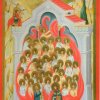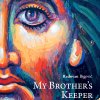The Holy Assembly of Bishops of the Serbian Orthodox Church, during today's session rendered the decision to enter two priest martyrs and forty students-martyrs of Momisici into the Diptych of Saints and that their celebration (formal declaration of sainthood; canonization) be at the Holy Hierarchical Divine Liturgy at the St. Sava Memorial-Church on Vracar on Saturday, May 19, 2012, led by His Holiness Patriarch Irinej of Serbia at which their long and prayerful respect among the faithful of the Serbian Orthodox Church will be confirmed.
.History of the Martyrs of Momisici
Two priests, serving as religious education teachers, and their forty students, children from the parish mostly from the brotherhood of Popovic were burned alive in 1688 at the St. George Church in the modern day Podgorica suburb of Momisici, at the hand of the Sulejman-Pasha army of Skadar, as a sign of retaliation which the Osmanlija Turks suffered from the hill tribes the previous months, particularly from Kucha.
Their relics were gathered and buried beneath the holy altar table of the St. George Church. During the entire time of Turkish rule, the relics remained in this church until 1936 when, with great honor and the litiya-procession of the people the relics were transferred to the renovated St. George Church in Momisici and placed beneath the holy altar table there. In 2006 the relics were taken out for the faithful to venerate on the feastday of the Holy 40 Martyrs of Sebaste, known commonly among the people as Holy Youths Day, after which Metropolitan Amphilohije, together with the clergy, washed them with wine and anointed them with rose oil according to the ancient Orthodox custom. Since then they can be found in a reliquary on the left hand side of the iconostasis of the Momisici church of St. George, which, since then, has also been dedicated to their holy memory. In commemoration of the last finding of their relics, for some years now in the Metropolitanate of Montenegro and the Coastlands their liturgical commemoration is celebrated on the feast of the Holy Martyrs of Sebaste.





